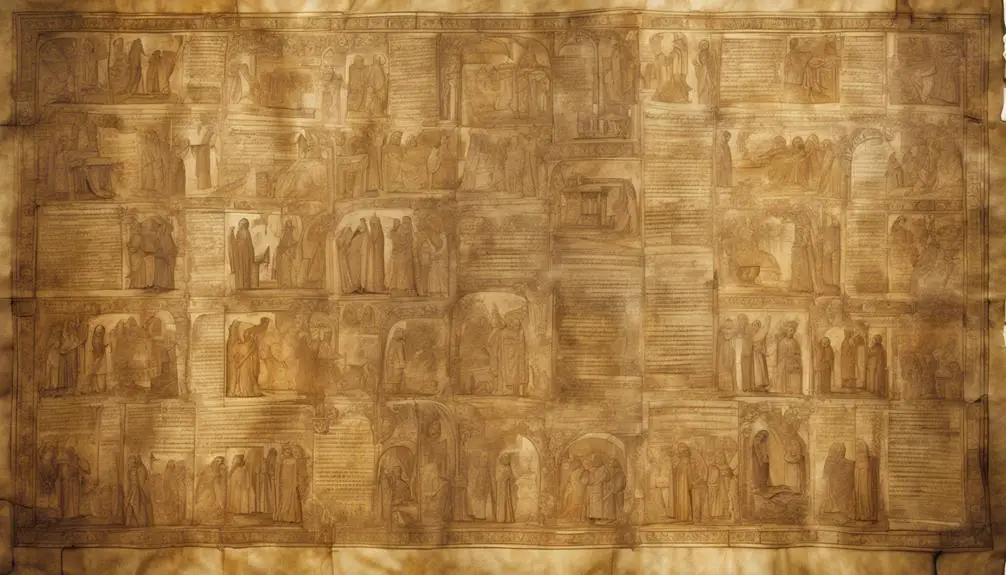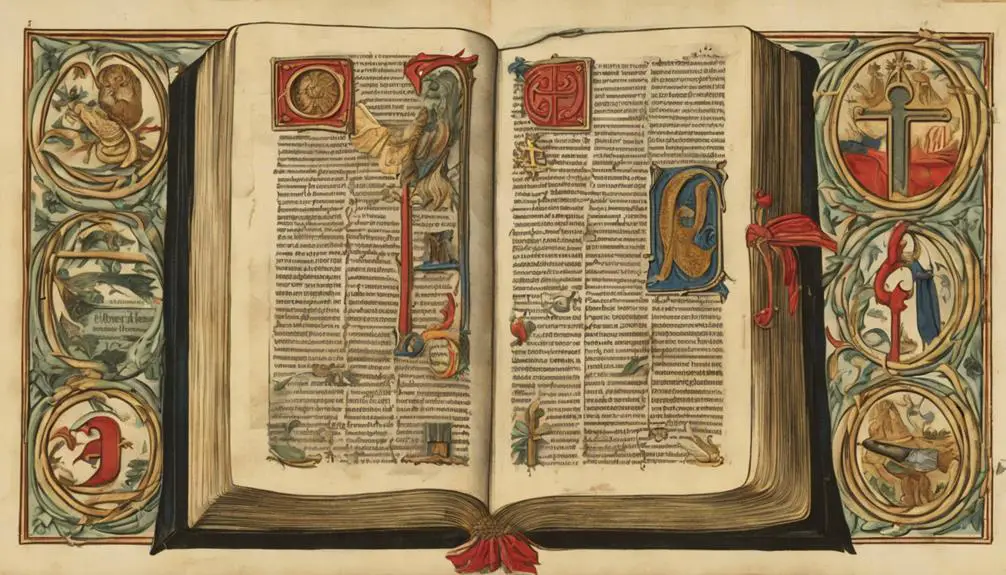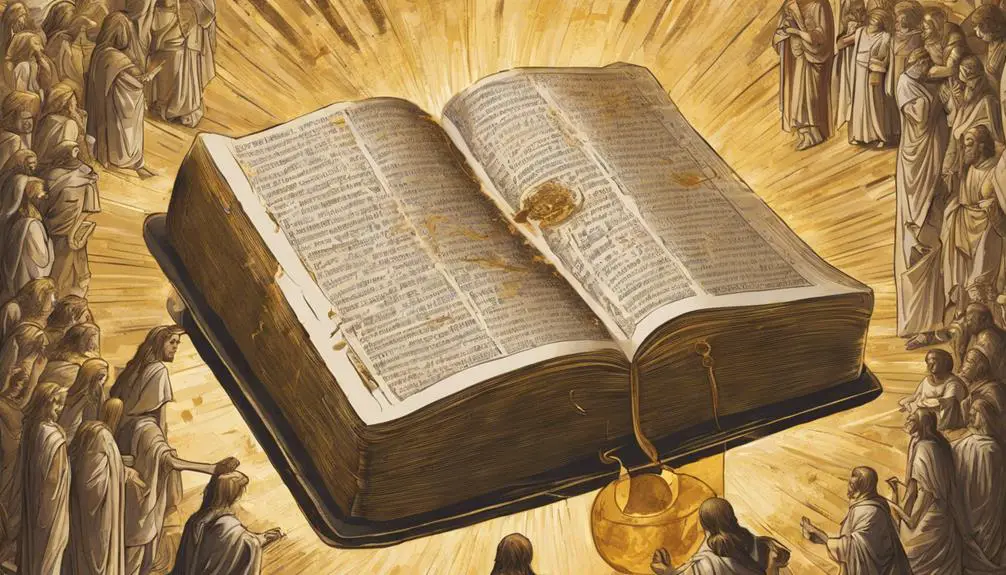Hop into a riveting journey exploring biblical names starting with 'P', uncovering their unique narratives and hidden meanings.

Names in the Bible That Start With P
Isn't it intriguing how many names in the Bible start with the letter 'P'? You've probably noticed this, too, and may even be wondering about the stories behind these names.
From Paul and Priscilla to Philemon, each one carries a distinct narrative and significance that offers a deeper understanding of biblical times. Let's embark on an exploration of these names, their origins, and the intriguing tales they tell.
Will you join in the discovery of the fascinating insights these names provide?
Key Takeaways
- Biblical 'P' names carry symbolism, often reflecting character traits, history, and divine messages.
- Key Biblical figures with 'P' names, like Paul and Priscilla, greatly influenced early Christianity.
- Names beginning with 'P' showcase narratives of authority, endurance, and divine providence in Biblical stories.
- Lesser-known 'P' names, such as Phinehas, Palti, and Puah, also contribute to the richness of Biblical teachings.
The Significance of Biblical Names

In exploring the Bible, you'll quickly discover that names aren't merely arbitrary, but carry significant symbolism and meaning, often reflecting the character, history, or destiny of the individuals they're attached to. This idea is central when decoding the meaning of Biblical names, as each name carries a distinct story and purpose.
The process of decoding these names involves deep analysis and comprehension of ancient languages like Hebrew and Greek. For example, Peter, a name starting with 'P', derives from the Greek word 'Petros', meaning 'rock', symbolizing his foundational role in Christianity. Thus, symbolism in Biblical names isn't a mere linguistic exercise, but a historical, cultural and theological exploration.
Understanding the symbolism in Biblical names allows you to delve deeper into the narratives, offering a nuanced understanding of the text. You'll grasp not just the literal, but also the metaphorical implications, giving you a richer perspective on Biblical teachings. This knowledge also provides a more personal connection to the characters and their stories, enhancing your overall spiritual journey. Therefore, discerning the significance of Biblical names is essential in your comprehension and appreciation of this sacred text.
Understanding the Letter 'P

Let's dive into the profound significance of Biblical names starting with the letter 'P', a letter that often marks names with powerful symbolic meanings and intriguing historical contexts. In the Hebrew alphabet, the letter 'P' is represented by 'Peh', symbolizing the mouth and speaking. It illustrates the Power of Pronunciation, the ability of words to create, destroy, heal, or harm.
Analyzing 'P' names in the Bible, you'll find diverse expressions of power and potential. For instance, 'Priscilla' embodies ancient strength, while 'Philemon' denotes affectionate love. 'Perez' signifies a breakthrough, a powerful narrative of overcoming obstacles. These names aren't merely labels; they're profound reflections of character traits and destinies.
Understanding 'P' in the Hebrew Alphabet and the power it holds in pronunciation is crucial to comprehending Biblical names. It's not just about the sound, but the meaning, the essence that's invoked when that name is pronounced. 'P' names in the Bible are carriers of potent messages, testifying to the divine power of language and the enduring relevance of Biblical narratives. So, when you next encounter a name beginning with 'P', remember, it's more than a letter; it's a symbol, a story waiting to be told.
Profiling the Apostle Paul

Shifting our focus from the broad spectrum of 'P' names in the Bible, you'll find the Apostle Paul to be a fascinating figure whose name perfectly embodies the power and potential this letter carries.
Paul's journey is an extraordinary one. Initially known as Saul, he was a fierce persecutor of Christians. However, his life took a dramatic turn during his trip to Damascus. This sudden shift, known as Paul's conversion experience, was a defining moment in his life and in the history of Christianity.
- Paul's life before his conversion
- The transformative event on the road to Damascus
- Paul's mission after his conversion
After his conversion, Paul played a substantial role in establishing churches across the Roman Empire. His relentless efforts to spread the message of Jesus Christ resulted in the formation of numerous Christian communities. Paul's letters to these churches form a significant part of the New Testament and continue to guide Christians today.
In studying Paul, you're not just exploring an individual, but delving into the transformative power of faith, the birth of churches, and the spread of Christianity. His story remains an inspiring testament to the transformative power of faith.
Priscilla: A Key Biblical Figure

Continuing our exploration of biblical figures with 'P' names, you'll find Priscilla, a woman of intellect and faith whose influence in the early Christian community is profound and often overlooked. Priscilla's leadership role is apparent in her teachings and interactions with other prominent figures of the early church.
Priscilla, alongside her husband Aquila, instructed Apollos, an eloquent preacher of the gospel who initially lacked the full understanding of Christ's teachings. Displaying remarkable intellectual prowess and scriptural knowledge, Priscilla corrected and guided him, subtly changing the course of early Christian teachings.
Priscilla's impact on early Christianity isn't limited to her interactions with Apollos. She was also mentioned in Paul's letters as his coworker in Christ Jesus, indicating her active role in spreading the gospel. Her role as a leader, teacher, and influencer in a male-dominated society is a testament to her strength and faith.
Priscilla's place in the Bible is emblematic of the significant roles women played in the early church. Her story serves as a reminder of the influence and leadership that women can wield, even in societies and eras where they're often overlooked or undervalued.
The Story of Philemon

Turning our focus to Philemon, you'll find his story provides a revealing glimpse into the personal relationships and social dynamics of early Christianity. As a wealthy man and a slave owner, Philemon's encounter with Apostle Paul transformed his life and his outlook on the slave and master relationships.
His story is encapsulated in the book of Philemon, one of Paul's shortest epistles in the New Testament. The story revolves around Philemon's runaway slave, Onesimus. However, it's not just a story of escape and return; it encompasses Philemon's forgiveness and highlights the transformative power of the Gospel.
The narrative provides profound insights into:
- The historical context of slavery during the early Christian era.
- The radical teachings of Apostle Paul on equality and brotherhood.
- The practical manifestation of Christian forgiveness and reconciliation.
Philemon's forgiveness towards Onesimus is a pivotal moment, revealing the transformative power of Christian love and forgiveness. It challenges the conventional master-slave relationship and sets a precedent for social relationships within the Christian community. This story holds a mirror to society, prompting a reevaluation of social norms and personal prejudices, all while emphasizing the power of transformative forgiveness.
Other Biblical Names Starting With 'P

Having explored the story of Philemon, let's now broaden our scope to examine other significant biblical figures whose names also begin with 'P'.
One such figure, Palti, embarks on a profound biblical journey. Palti, meaning 'my deliverance' in Hebrew, is a character from the Old Testament. He was given Michal, King Saul's daughter, as a wife even though she was David's wife first. His story is a complex tale of love, loyalty, and political intrigue, providing a unique perspective on the trials and tribulations of the time.
Turning our attention to the Book of Proverbs, we find it riddled with named characters starting with 'P'. These characters, including Priscilla and Phoebe, play significant roles in delivering the book's wisdom-filled messages. Priscilla, for instance, is a teacher of the early Christian church, while Phoebe is a deaconess at Cenchreae. Their stories not only enrich the narrative of Proverbs but also give insights into the societal roles and expectations of women during biblical times.
These 'P' names, along with Philemon, form a fascinating tapestry of biblical narratives, each contributing to the larger story in their unique way.
Frequently Asked Questions
What Are Some Less-Known Biblical Names That Start With 'P'?
You're searching for less-known names starting with 'P' from the Bible. Well, 'P's gender significance is interesting. Paltiel, Phinehas, and Penuel are male names. Yet, there's Priscilla, a female name.
Pronunciation challenges also accompany these, like Perga, a city, or Persis, a woman. It's a mix of unique, less recognized names, each carrying its own historical and theological weight.
Diving deeper into these names can certainly enrich your understanding of biblical literature.
Are There Any Significant Biblical Events Associated With Names That Start With 'P'?
You're curious about significant biblical events linked to names starting with 'P'.
Considering 'P's symbolism in a biblical context, it often signifies power and prominence.
Phonetics of 'P' in ancient languages also carry importance.
For instance, Paul's conversion on the road to Damascus profoundly influenced Christianity.
Also, the story of Potipar's wife in Genesis marked a vital turning point in Joseph's life.
How Many Names in the Bible Start With the Letter 'P'?
You're inquiring about the frequency of 'P' starting names in the Bible. There isn't a definitive count, as the Bible's been translated into many languages, influencing name variations.
However, there are several prominent 'P' names, like Peter, Paul, and Pharaoh. This suggests a significant cultural influence on 'P' names, reflecting societies where the Bible was translated.
To get an exact number, a comprehensive study of all biblical translations would be needed.
Are There Differences in the Meanings of Old and New Testament Names Beginning With 'P'?
Yes, differences exist in the meanings of Old and New Testament names starting with 'P'. They're often influenced by the biblical culture of their time.
For example, Old Testament 'P' names may carry symbolism related to Jewish history or tradition. In contrast, New Testament 'P' names might reflect influences from the Greco-Roman world.
Understanding these differences can deepen your appreciation of biblical narratives.
What Are Some Common Misconceptions About Biblical Names Starting With 'P'?
You might think all biblical names beginning with 'P' have similar meanings or origins. However, exploring the etymology reveals diverse roots and interpretations.
These names are influenced by various cultures, leading to common misconceptions. For instance, you might assume 'Paul' and 'Peter' share a similar origin due to their initial letter, but they actually have distinct meanings and cultural influences.
Understanding these nuances can enhance your appreciation of biblical names.
Conclusion
You've journeyed through the significance of biblical names, grasped the essence of the letter 'P' and explored characters like Paul, Priscilla, and Philemon.
Your understanding of these names that start with 'P' from the Bible has deepened, and hopefully, you've discovered some new insights.
The Bible's rich tapestry of names and stories continues to provide endless fascination, study, and reflection. Keep exploring and you'll continue to uncover more layers of historical and spiritual significance.



Sign up